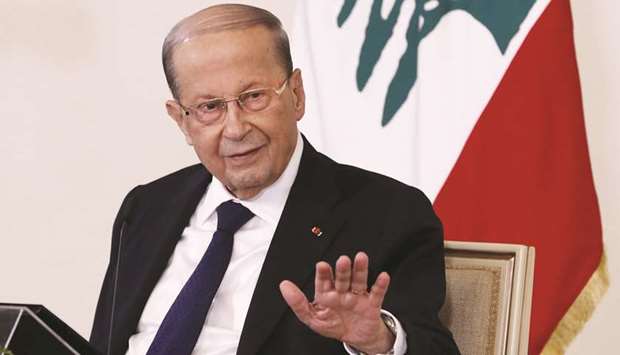Crisis-hit Lebanon’s next prime minister, the third in a year, will have to spearhead reforms and battle corruption, President Michel Aoun said yesterday.
Aoun was speaking at a televised news conference a day before his scheduled consultations with MPs to name Lebanon’s new premier.
“I hope that you will think well about the consequences the nomination (of a premier) will have on the process of forming a government,” Aoun said, addressing lawmakers.
It will effect “reform plans and international rescue initiatives”, he said.
Saad Hariri resigned as premier in October 2019 in the wake of unprecedented street protests, but he is now expected to make a comeback at the helm of the next government.
Most parliamentary blocs have pledged support for Hariri, although Aoun and his Free Patriotic Movement are against his nomination.
However, the FPM’s allies, the powerful Hezbollah movement and Amal, are expected to endorse Hariri.
“Will the person who will have to bear the burden of being named and forming a government commit to addressing corruption and launching a reform drive?” Aoun asked.
Lebanon has appointed two new premiers since Hariri resigned last October.
Hassan Diab, a little known academic, was named as Hariri’s replacement in December last year.
His cabinet of so-called “technocrats” resigned in the wake of the huge August 4 blast at Beirut port widely blamed on government negligence.
Lebanon’s worst peace-time disaster killed more than 200 people and wounded at least 6,500 others.
Lebanon’s ambassador to Berlin, Mustapha Adib, was then named in September but bowed out last month over the failure of political leaders to agree on a cabinet line-up.
French President Emmanuel Macron, who has visited Lebanon twice since the blast, said its ruling class had “betrayed” the people by failing to form a new cabinet.
The process can take months in Lebanon, where consensus between most of its top political groups is required for major decisions.
Despite mounting international pressure, Lebanese parties are still bickering over the distribution of cabinet posts and portfolios.

Lebanese President Michel Aoun speaks at a televised press conference at the presidential palace in Baabda, east of the capital Beirut yesterday.
